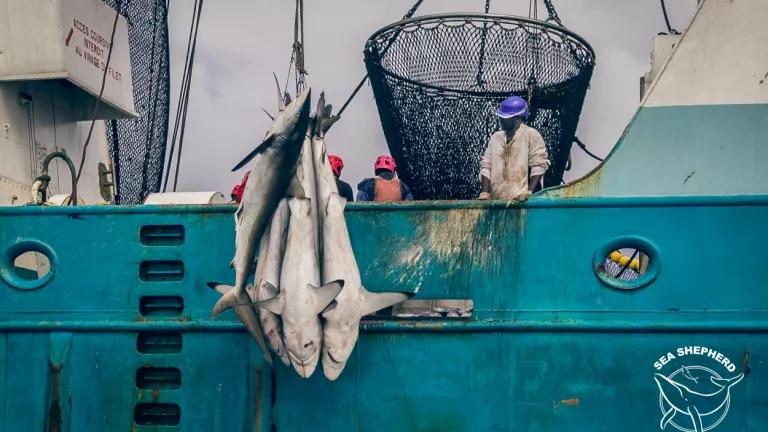It’s Time to Get Serious about Ending Illegal Fishing
This ruthless rush for seafood is depleting fish populations; harming marine habitats; and placing key species—like marine mammals, sea turtles, and sharks—at risk.

A scalloped hammerhead shark swimming in the ocean
Every day, vessels engaged in illegal, unregulated and unreported (IUU) fishing travel to remote and unmonitored locations to capture valuable marine species, often defying national and international laws to secure their catch. This ruthless rush for seafood is depleting fish populations; harming marine habitats; and placing key species—like marine mammals, sea turtles, and sharks—at risk.
And IUU fishing has ties to other crimes, including forced labor and human rights abuses, some of which drive overfishing by enabling vessels to stay at sea for months or even years at a time.
Every two years, the U.S. has an exceptional chance to step up and lead the global fight to eradicate illegal fishing from our global oceans. That’s because Congress has directed the Secretary of Commerce, through the National Marine Fisheries Service (NMFS), to produce a biennial Report to Congress that lists all of the nations in the world that have been engaged in IUU fishing within the past three years. The U.S. then consults with those nations to help strengthen laws, policies, and enforcement efforts to fight IUU fishing within their fleets—and, ultimately, to help stamp out this ocean scourge for good. Nations that fail to correct violations are issued a “negative certification,” which can lead to the hammer of sanctions on seafood imports to the U.S.
The 2021 IUU Report to Congress is due to be released in June, and NMFS is currently collecting evidence of IUU fishing to inform this report. On December 23, 2020, NRDC and Earthjustice jointly submitted an extensive Evidentiary Report to NMFS, with evidence to support the listing of over 70 nations and regions for illegal fishing between 2018‑2020, including well over 250 instances of IUU fishing, at least eight instances of shark catch on the high seas, and at least 15 instances of bycatch of “protected living marine resources,” such as dolphins, whales, sea turtles and sharks.
And that’s just the tip of the iceberg. Violations under the High Seas Driftnet Fishing Moratorium Protection Act (HSDFMPA) include IUU fishing by one or more vessels in a nation’s fleet, bycatch of certain protected marine species, or fishing for sharks on the high seas by a nation that lacks a management program comparable to that of the U.S. Because sharks are top victims of IUU fishing, and because unsustainable or illegal shark fishing is addressed under all three “prongs” of the Act, NRDC and Earthjustice focused our report on these crucially important, highly vulnerable ocean predators.
Sharks suffer greatly from IUU fishing. Frequent victims of bycatch, sharks are also a target species, primarily for their lucrative fins. The high value of fins incentivizes fishermen to fin sharks, an inhumane and wasteful practice where fishermen slice the fins from a shark’s body and then discard the shark at sea, often to die a slow and painful death. But sharks, which are slow to mature and have low reproductive rates, are ill-equipped to withstand this kind of intense fishing pressure. As many as a quarter of all sharks, rays, and chimaeras are considered at risk of extinction, and some shark populations have plummeted by more than 80% in recent years.
Our report includes extensive evidence of illegal shark fishing, from all around the world. We found hundreds of instances of nations and regions failing to comply with international laws that govern fishing in the Pacific and Atlantic Oceans—including violation of shark-finning bans, retention bans for threatened shark species, to failures to submit catch data that is crucial to conserving sharks in areas where vessels fish for tuna and other open-ocean fish. We presented evidence of bycatch of protected shark species and other marine wildlife. And we highlighted evidence that strongly suggests large-scale, systemic—and sometimes atrocious—shark-fishing operations in several distant-water fleets that fish the high seas.
For example, reports published by Greenpeace and the Environmental Justice Foundation present crew testimony and photographic evidence that strongly suggests systemic illegal shark fishing on multiple vessels within certain fleets: including targeting sharks with special fishing gear, finning sharks and discarding their carcasses at sea, and catching dolphins to use their meat for shark bait. These reports also indicate human rights abuses of the often-migrant fishermen who staff these boats, from extremely long working hours to threats of pay reduction to physical abuse.
The evidence is damning. It paints a picture of rampant illegal fishing, which pillages our oceans at an alarming rate, at tremendous cost to ocean wildlife, marine habitats, and to people. And this story is not new.
But despite this overwhelming evidence, the U.S. chronically under-leverages the HSDFMPA and fails to use this strong U.S. law as it should: to drive compliance with international agreements and pressure foreign nations to crack down on IUU fishing within their fleets.
Congress has amended the HSDFMPA multiple times since 2006, making it ever-easier for NMFS to identify nations—including clarifying in 2016 that IUU fishing by even a single vessel requires NMFS to list a nation. But NMFS chronically declines to use the Act as it was intended. For example, in 2019, despite evidence to support identification of over 50 nations and regions, NMFS identified only three nations in its Report to Congress.
And, despite the fact that finning and targeting of sharks is known to occur in international waters, NMFS has never identified any nation for fishing for sharks on the high seas.
NMFS, it’s time. Congress has made clear its intent to shine a light on the extent of IUU fishing across our oceans and to use the strength of U.S. law to drive other nations to eradicate the problem. The 2021 IUU Report to Congress is a critically important opportunity to step up and lead—for the sake of our oceans, our ocean wildlife, and the people whose lives are ruined by the atrocities of illegal fishing.



